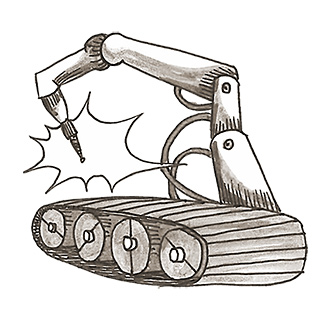
Related Questions
- How do electricity transmission lines withstand a lifetime of exposure to the elements?
- How do touch-sensitive screens work?
- Can we make robots that experience emotions?
- Why can’t we put metal objects in a microwave?
- What is the function of a hydraulic bypass valve?
- How do you make and install a lightning rod?
Why is it cheaper to make new plastic bottles than to recycle old ones?
Because oil is cheap — and it’s easier to extract a natural resource out of the ground than it is to recycle plastic.
By Jennifer SuttonMost plastics today are made of petrochemicals, essentially oil and natural gas, and most of them are not recycled, says Tim Gutowski, professor of mechanical engineering. The only plastic that is moderately recycled is made from polyethylene terepthalate (PET), a petroleum product, and according to the National Association of PET Container Resources, only 27 percent of PET-based plastic containers were recycled in the U.S. in 2008.
There are two problems to be solved when recycling plastic, Gutowski says: “Generating a pure stream of recycled material, and making sure there is sufficient residual value in it.” PET plastic does have residual value; it can be recycled into everything from fleece clothing to new containers. But, Gutowski says, “there are complications involved in isolating the material to be recycled,” depending upon the product you’re trying to recycle and the waste mixed in with the PET.
There are often lots of additives in plastic products, such as reinforcements, fillers, and colorants. Recycling companies don’t usually know what, exactly, they are getting, and in general, different kinds of plastic cannot be combined in manufacturing a recycled product. For example, very small amounts of PVC can significantly degrade PET. Sorting and separating out the recyclable material is labor-intensive and expensive. “When you compare that with pumping oil out of the ground, using its established production and distribution system, it’s hard for recycling to compete,” Gutowski says. “From the manufacturers’ point of view, oil’s a safer bet.”
The functionality of a product made from recycled plastic, as opposed to virgin plastic, is also an issue. Gutowski says that manufacturers use virgin steel to make cars, but recycled steel for construction materials such as reinforcing bars and structural beams. Gutowski once visited a recycling center where picnic tables had been built out of lumber made from recycled plastic, and people had gotten rashes on their elbows after using them. “Would people want to drink water out of recycled plastic?” he wonders. Plastic can be recycled at the molecular level to make a perfectly clean product, he says. “It’s expensive, but the technology is there. Other countries have subsidized this kind of effort.”
Gutowski believes that “properly priced” energy would lead us to recycle more plastic. But petroleum — and all of its external costs — is underpriced right now, he says. “People would make different decisions if the environmental consequences and economic consequences coincided, but the economic incentive is not there.”
Posted: December 15, 2009